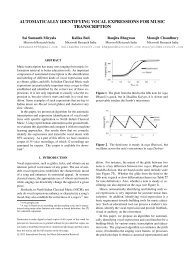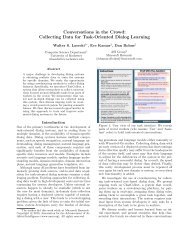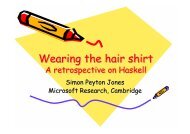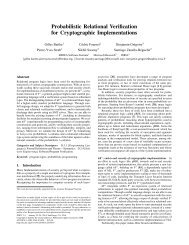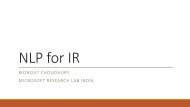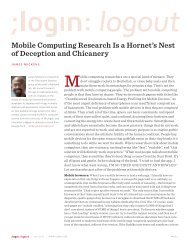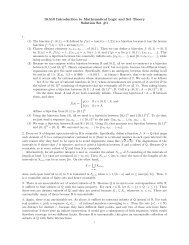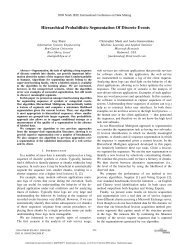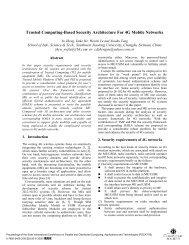slides - Microsoft Research
slides - Microsoft Research
slides - Microsoft Research
Create successful ePaper yourself
Turn your PDF publications into a flip-book with our unique Google optimized e-Paper software.
Objective<br />
Building a Platform for<br />
Efficient Collaborative <strong>Research</strong><br />
Percy Liang<br />
To create a collaborative ecosystem for conducting<br />
computational research in an efficient and reproducible<br />
manner.<br />
<strong>Microsoft</strong> Faculty Summit<br />
July 16, 2013<br />
1<br />
Lack of reuse<br />
Step 1: come up with a good idea<br />
The current research process<br />
Step 2:<br />
Find data, clean it, convert between formats<br />
Find code, compile it, email authors, reimplement<br />
Run experiments, keep track of multiple versions<br />
2<br />
3<br />
Non-exhaustive comparisons<br />
Uncontrolled comparisons<br />
Previous method Our method<br />
Dataset 1 88% accuracy 92% accuracy<br />
Dataset 2 72% accuracy 77% accuracy<br />
Dataset 3 ? ?<br />
Dataset 4 ? ?<br />
Dataset 5 ? ?<br />
Dataset 6 ? ?<br />
... ? ?<br />
Previous method<br />
Our method<br />
88% accuracy 92% accuracy<br />
using sampling<br />
using optimization<br />
regularization regularization<br />
5-fold cross-validation 10-fold cross-validation<br />
one set of bugs<br />
another set of bugs<br />
4<br />
5
Lack of good broad overview<br />
Question: Which algorithms work well on what types of<br />
datasets?<br />
6<br />
An outsider's perspective<br />
Difficult to understand the problems:<br />
classification<br />
regression<br />
ranking<br />
structured prediction<br />
statistical relational learning<br />
...<br />
Difficult to find reliable solutions:<br />
logistic regression<br />
kernel methods<br />
topic models<br />
conditional random fields<br />
hidden Markov models<br />
...<br />
7<br />
Outline<br />
MLcomp: code, data, comparison<br />
MLcomp: code, data, and comparison<br />
CodaLab: complex workflows<br />
8<br />
9<br />
People with programs:<br />
A meeting place<br />
Programs: SVMlight<br />
Components<br />
C implementation of support vector machines for<br />
classification by Thorsten Joachims.<br />
How well does my method work compared to others?<br />
People with datasets:<br />
What is the best method for my problem?<br />
Datasets:<br />
Runs:<br />
thyroid<br />
Task is to predict whether a patient has thyroid disease<br />
given attributes (age, gender, I131 treatment, etc.)<br />
Program : SVMlight<br />
Dataset : thyroid<br />
Error : 2.6%<br />
Time : 1 second<br />
10<br />
11
Users upload programs<br />
Usage<br />
Result<br />
Datasets<br />
5.6 6.2 2.0 5.6 4.7 3.0 8.1 7.5 7.2 7.0 2.1 5.2 4.6<br />
Users upload datasets<br />
System runs programs on datasets<br />
Everything happens in a distributed/asynchronous<br />
manner.<br />
Programs<br />
1.1 1.4 5.0 10.0 1.2 7.8 1.1 5.7 8.6 9.1 6.2 0.9 4.8<br />
5.5 4.5 0.1 0.6 7.3 1.7 0.8 0.6 7.2 9.2 0.1 1.8 1.7<br />
0.4 1.5 2.7 0.4 7.5 5.7 8.2 3.3 9.0 8.3 5.1 0.8 9.5<br />
9.0 8.9 3.1 9.5 9.6 6.0 6.3 3.1 4.4 7.8 0.7 6.6 3.9<br />
3.5 5.2 1.6 4.6 9.3 7.0 7.0 2.0 2.2 4.1 6.1 2.5 9.5<br />
1.9 7.4 2.9 1.5 1.2 9.7 6.3 0.0 6.4 1.3 2.3 1.0 0.9<br />
3.3 9.5 9.8 7.1 8.3 6.4 1.1 3.4 8.9 2.5 9.5 2.2 3.9<br />
12<br />
13<br />
Generalization<br />
Design decisions<br />
Evaluation:<br />
Program run on dataset , get some accuracy<br />
Only meaningful if is independent of<br />
In papers, this is never true!<br />
In MLcomp:<br />
People upload program<br />
People upload new dataset afterwards<br />
Guarantees that is not overfit to<br />
Program is an arbitrary Linux binary (support C++,<br />
Java, Python, R, etc.)<br />
User-uploaded programs and datasets conform to<br />
standard interfaces/formats<br />
All runs executed on Amazon EC2 (initiated by user or<br />
system)<br />
Users can download any programs/datasets/runs (not<br />
marked by user as restricted)<br />
14<br />
15<br />
Related projects<br />
Code repositories (mloss.org): only code<br />
Data repositories (UCI, mldata.org): only data<br />
Machine learning as a service (BigML, Google Prediction<br />
API): provide fixed set of programs, people submit<br />
(private) data; doesn't encourage development of new<br />
methods<br />
Competitions (Kaggle): provide fixed set of datasets,<br />
people submit predictions; doesn't promote general/clean<br />
solutions<br />
Status<br />
Development started in 2009 [with Jake Abernethy,<br />
Alex Simma, Ariel Kleiner]<br />
Today: 2129 users, 686 datasets, 390 programs, 19083<br />
runs<br />
Website: mlcomp.org<br />
Open-source on GitHub:<br />
https://github.com/percyliang/mlcomp<br />
16<br />
17
MLcomp's primitive:<br />
Delving deeper<br />
CodaLab: collaborative workflows<br />
accuracy = run(program, dataset)<br />
Want fuller analysis:<br />
Hyperparameter tuning / sensitivity analysis<br />
Learning curves (varying amounts of data)<br />
Error analysis: ROC, confusion matrices, predictions<br />
Visualization: plot all these statistics<br />
18<br />
19<br />
Text understanding<br />
AI problems require complex workflows<br />
Peter Houser, a 68-year-old man with a history of hypertension, has an aortic<br />
aneurysm repaired. On the first postoperative day, he is transferred from the<br />
intensive care unit (ICU) to the medical-surgical unit. Mr. Houser has a midline<br />
incision, a nasogastric tube connected to low intermittent suction, and a left<br />
subclavian triple lumen catheter. On receiving Mr. Houser from the ICU, the nurse<br />
notes that he has edema of both lower extremities, and his pedal pulses are not<br />
palpable in either foot. Which of these actions should the nurse take?<br />
System<br />
Use a hand-held Doppler ultrasound device to reassess his pulses.<br />
20<br />
21<br />
Stages of an NLP workflow<br />
Three principles<br />
tokenization<br />
part-of-speech tagging<br />
raw text<br />
clustering<br />
Modularity<br />
named-entity recognition<br />
syntactic parsing<br />
gazeteer<br />
Google n-grams<br />
Immutability<br />
coreference resolution<br />
relation extraction<br />
Wikipedia<br />
Literacy<br />
22<br />
23
Principle 1: modularity<br />
AI problems require efforts of entire community<br />
People specialize, contribute in decentralized way<br />
Intermediate tasks<br />
Old: use intermediate metrics, rhetoric<br />
New: plug in and see ramifications automatically<br />
24<br />
25<br />
A collaborative ecosystem<br />
Principle 2: immutability<br />
Modules interoperate<br />
via standard interfaces<br />
(Internet)<br />
Individual benefits:<br />
Avoid duplicate work<br />
Publicize tools/datasets<br />
Commununity benefits:<br />
Serial combination of components<br />
Parallel ensembles for better predictions (Netflix Prize)<br />
26<br />
Inspiration: Git version control system<br />
All programs/datasets/runs are write-once<br />
Enable collaboration without chaos<br />
Capture the research process in a reproducible way<br />
27<br />
Principle 3: literacy<br />
MLcomp is about truth; what about interpretation?<br />
CodaLab worksheet<br />
We now train the classifier with more data.<br />
Inspiration:<br />
Mathematica notebook, IPython notebook: interleave<br />
code with text descriptions<br />
Program : SVMlight<br />
Arguments : -n 2000<br />
Dataset : thyroid<br />
Error : 2.6%<br />
Time : 1 second<br />
Notice that the error remains the same, suggesting that we've<br />
saturated our model.<br />
28<br />
Use cases:<br />
Informal blog posts<br />
Formal executable papers<br />
29
Related projects<br />
runmycode.org, myexperiment.org, Weka require<br />
specific formats<br />
Matlab/R/Perl/Python/Ruby provide code modules, but<br />
no data; data is a resource<br />
Challenges<br />
Inertia:<br />
Problem: People have personal setup, takes effort to<br />
port to foreign environment<br />
Solution: Easy to contribute, benefits of online sharing<br />
(Dropbox + execution)<br />
Search:<br />
Problem: CodaLab is general repository, how to<br />
search?<br />
Solution: Smart autocomplete, ranking,<br />
recommendation<br />
30<br />
31<br />
Status<br />
Collaboration with <strong>Microsoft</strong> <strong>Research</strong> Connections<br />
Project hosted by the Outercurve Foundation<br />
People:<br />
Development: Christophe Poulain, Beau Hargis, Justin<br />
Carden, Dan O'Donnell<br />
Program/community: Evelyne Viegas, Erick Watson,<br />
Lori Ada Kilty, Ivan Judson, Simon Mercer<br />
Final remarks<br />
To create a collaborative ecosystem for conducting<br />
computational research in an efficient and reproducible<br />
manner.<br />
Questions/feedback?<br />
Design: Chrisopher Rampey<br />
32<br />
33



